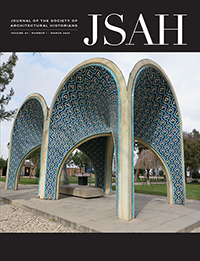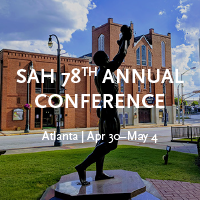-
Membership
Membership
Anyone with an interest in the history of the built environment is welcome to join the Society of Architectural Historians -
Conferences
Conferences
SAH Annual International Conferences bring members together for scholarly exchange and networking -
Publications
Publications
Through print and digital publications, SAH documents the history of the built environment and disseminates scholarshipLatest Issue:

-
Programs
Programs
SAH promotes meaningful engagement with the history of the built environment through its programsMember Programs
-
Jobs & Opportunities
Jobs & Opportunities
SAH provides resources, fellowships, and grants to help further your career and professional life -
Support
Support
We invite you to support the educational mission of SAH by making a gift, becoming a member, or volunteering -
About
About
SAH promotes the study, interpretation, and conservation of the built environment worldwide for the benefit of all
International Architecture Conference Turns Spotlight on Austin
Nov 14, 2013
by
User Not Found
Built Environment Professionals Discuss Historic Architecture and Austin’s Rapid Growth at the Society of Architectural Historians Annual Conference, April 9-13

Austin City Hall (photo: Gia Marie Houck)
The 67th Annual Conference of the Society of Architectural Historians (SAH) will bring more than 600 scholars and professionals from around the world to Austin, Texas, to share the latest research on the built environment, tour architectural sites and engage local audiences in a discussion of the issues Austin faces as a rapidly growing city. Architectural historians, art historians, city planners, civic leaders, preservationists, landscape architects, architects and more will convene during the SAH Annual Conference, which takes place April 9–13, 2014, at the Hyatt Regency Austin (#SAH2014).
SAH chose to hold its conference in Austin not only because of its rich architectural and cultural history, but because of the opportunities and challenges it faces as one of the the fastest growing cities in the United States. The city’s healthy job market and vibrant entertainment scene have attracted droves of new residents. Long known as the Live Music Capital of the World®, Austin is forging a new reputation as a hub of technology as tech entrepreneurs set up shop, drawn to the favorable business climate and progressive vibe. Fast-paced development, rapid urbanization and increased housing demand present new challenges to the interpretation and preservation of historic architecture.
These issues will be explored during the SAH Austin Seminar, “Austin and the Place of Historic Architecture in Rapidly Growing Cities,” that takes place on Saturday, April 12. Michael Holleran, director of the Historic Preservation program at the University of Texas at Austin, will facilitate the seminar, which will explore how Austin and other cities within the Texas Triangle Megaregion (bounded by Dallas-Fort Worth, Houston and San Antonio) are handling the challenges exponential growth pose to the interpretation and preservation of historic buildings and neighborhoods. The seminar will be open to the public in order to encourage local audiences to participate in the discussion. Addressing salient issues facing local communities and engaging with the host city—its professionals as well as the interested public—is a priority for SAH.
“The SAH Austin Seminar will be a great forum for Austinites and conference participants to meet and discuss the challenges of preserving the cultural heritage of important historic neighborhoods, like East Austin,” says SAH Executive Director Pauline Saliga. “The best part is that the discussions will continue as participants take the lessons learned to their classrooms, architectural offices and public disucssions in the U.S. and around the world.”
The seminar will open with a keynote address by architectural historian Stephen Fox, Anchorage Foundation fellow and lecturer at Rice University and the University of Houston. “Architectural History, Public Discourse, and Political Action in Texas: Looking Backward and Forward” will examine how architectural history emerged as an instrument of public discourse in Texas during the twentieth century and was mobilized to challenge development projects that threatened to destroy the Texan cultural identity embodied in works of architecture and landscape.
Two panels of regional experts with diverse backgrounds will address key questions during the seminar. The first panel will focus on how changing social and environmental contexts require new approaches to interpreting buildings and landscapes, and the second will discuss historical buildings and their place in booming cities. Panelists include: Barbara Brown Wilson, director of the Center for Sustainable Development at The University of Texas at Austin; Sarah Lopez, architectural historian, UT Austin; historical anthropologist Fred McGhee, principal, Fred L. McGhee & Associates; Jennifer Minner, planner, Department of City and Regional Planning at Cornell University; executive director of Preservation Dallas, David Preziosi; John Rosato, principal, Southwest Strategies Group; and planner Frederick Steiner, dean of the School of Architecture and Henry M. Rockwell Chair in Architecture at UT Austin.
“The SAH Austin Seminar is an opportunity for those of us working in Central Texas to place the challenges we face within a broader conversation among scholars and professionals from around the country and abroad who offer different perspectives but share our belief in the value of historic architecture and landscapes to the quality of life in our cities,” says Annual Conference Local Chair Richard Cleary, professor and Page Southerland Page Fellow in Architecture, University of Texas at Austin.
Twenty-one guided tours to locations in and around Austin will be offered, allowing conference attendees and the general public an opportunity to explore the city while learning from local experts. Tour sites include the French Legation, the Moore/Andersson Compound, the office of Lyndon B. Johnson and the gardens of Laguna Gloria and Mayfield Park, among others. Other tours will focus on religious architecture, historically black neighborhoods, midcentury modern residences and historic estates. The evolution of Austin’s riverfront will be investigated via a boat tour down the Colorado River. Additional tours will explore the nearby cities of San Antonio, Georgetown and Fredericksburg. Several self-guided tours will also be available.
The conference will include 35 paper sessions in a wide range of subject areas related to the history of the built environment, including architectural history, landscape architecture, urban planning, art history, environmental design and more. Many of the sessions offer an interdisciplinary focus on such topics as spatial violence; architecture and the unconscious; physiology, cognitive science and architecture; and colonialism and globalization. Two sessions will be devoted entirely to Texas architecture, and another session will cover health and architecture in the Southwest.
In addition, an awards ceremony will take place during the conference during which SAH will present six publication awards, 28 fellowships and induct three fellows into the Society. Two roundtable discussions on the subjects of teaching architectural history online and working as a scholar in the digital age will also be included.
SAH invites you to take part in its Annual Conference, hear the latest research in architectural history, exchange ideas and connect with people from around the world as you discover what makes Austin, Texas, such an enticing and architecturally rich city. Registration for the conference opens January 7, 2014. For more information and to register, visit sah.org/2014.
The Society of Architectural Historians promotes the study, interpretation and conservation of architecture, design, landscapes and urbanism worldwide. SAH serves a network of local, national and international institutions and individuals who, by vocation or avocation, focus on the built environment and its role in shaping contemporary life. SAH is headquartered in Chicago’s historic Charnley-Persky House, one of the few extant Louis Sullivan and Frank Lloyd Wright residences. The Society publishes its quarterly print Journal of the Society of Architectural Historians (JSAH) and the Buildings of the United States book series, organizes study tours and hosts the SAH Annual Conference. SAH’s digital resources include SAH Archipedia, a media-rich online encyclopedia of American architecture, and SAHARA, a shared online image archive for teaching and research. To learn more about SAH or to become a member, visit sah.org.
Conference Links
Conference Website: sah.org/2014
Paper Sessions
Conference Registration
Conference Press Kit
Conference Partners
University of Texas at Austin
AIA Austin
Austin Chamber of Commerce
City of Austin Parks and Recreation Department
Preservation Austin
Preservation Texas
Texas Historical Commission
For complimentary press registration, email Helena Karabatsos at hkarabatsos@sah.org.
Download Release (printer-friendly version): International Architecture Conference Turns Spotlight on Austin

